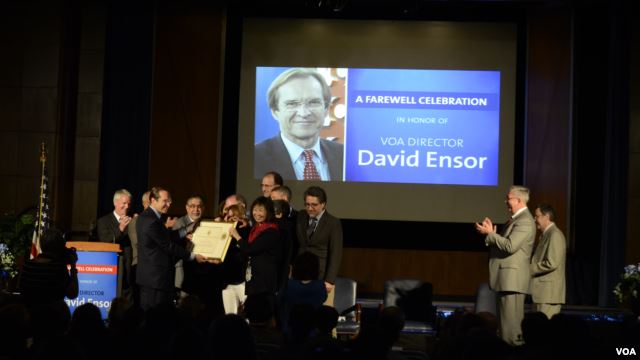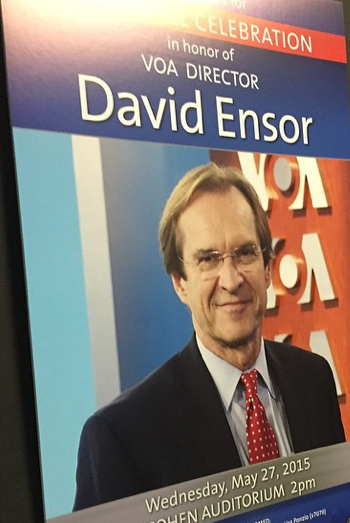BBG Watch
In a “FAREWELL” post on his official Voice of America blog, VOA director David Ensor tosses barbs at members of Congress for what he described as “ill-conceived legislative and internal reform proposals.”
BBG Watch reposts David Ensor’s “FAREWELL” post as a service to our readers.
###
The following article is a reposting of a blog post by VOA director David Ensor and does not reflect the views of BBG Watch.
FAREWELL

VOA Division Chiefs present Director David Ensor with an award for his service to Voice of America
Posted At: 27 May 10:02
It has been an honor to serve as the 28th director of the Voice of America. The VOA team can be enormously proud of what we have accomplished together. In the last four years, VOA has faced many challenges: from shrinking budgets, to propaganda broadcasts from Russia and China, to the rise of ISIS and an outbreak of Ebola.
VOA has also had to defend itself from sometimes ill-conceived legislative and internal reform proposals.
Yet VOA is keeping itself renewed to face the challenges of today’s fast-changing media environment. We are keeping on track with the human communications revolution now underway, and doing it cost effectively. Today, the Voice of America is reaching 172 million people a week at last count. That is 49 million more than the 123 million estimate produced for the Broadcasting Board of Governors covering 2010, the year before I arrived. That number may sound abstract but it represents something important: VOA has credibility and real global impact.
Back in 2011, when I first walked into the VOA newsroom, we were producing more than 70 news items a day, most of them based entirely on the wires. That was the right model for VOA in past years, but not for the faster-paced news organization we must be today. In 2015, VOA’s language services also have access to the wires, and their journalism is of a higher standard than ever before. The VOA News Center team is thus freer now to focus on original reporting – on journalism that makes us unique. A new Managing Editor and her team are beefing up the Washington beats, moving to a “digital first” workflow, and creating partnerships with language service reporters where they can add special insight or sources.
A new Opinion page on the English website is providing readers with varied views curated daily from American newspapers and websites – an ongoing example of the open debate that flourishes in our great democracy.
One major challenge – and opportunity – we face today is an explosion of new media outlets and ways for people to get their news. Mobile, social media, podcasts, desktop, Internet, direct-to-home satellite and of course radio – there are more of these sources than ever, and things are constantly evolving. VOA is seizing the new opportunities with cutting-edge efforts like Dandalin, the new Hausa Service programming stream – audio, pictures, text – designed especially for the mobile device. Four years ago, like many media organizations, we were still relative newcomers to social media. Now, we’re social media stars in many of our target countries. VOA Indonesian, for example, has more than 2.3 million Facebook likes. Our Khmer Service is independently ranked as Cambodia’s biggest Facebook page, with nearly 1.6 million likes. In China, some of our best pieces go viral, reaching tens of millions of Chinese before the censors can stop them.
In places like Africa, much of VOA’s huge impact comes about because we broadcast not just in the important colonial languages such as English and French, but also in vernacular tongues, such as Kirundi, and Bambara. As a result, we reach audiences well beyond the educated elites and, among them, many more women.
Right now the TV sector is where Voice of America is getting the most competition. It is where governments like Russia, China, and Iran are putting their money. It is also where our largest audience growth is underway. Since I got here, we have started new television programs in Russian, Ukrainian, Farsi, Mandarin, Burmese, Urdu, Kurdish, Pashto, Somali, Dari, Creole, English – and many more. Over the last four years, we have also seen big audience growth on satellite TV in one of the world’s most challenging markets: China. Since we moved more of China Branch resources to television, VOA Weishi has built an audience many times larger than it was four years ago — 75 percent of whom are under the age of 35.
In markets that are more open, we are building TV audiences through the affiliate model, and it may show the greatest promise for VOA’s future. In Latin America, Indonesia, Africa and elsewhere, we work closely with partner stations, producing content that audiences want. Our daily news show Africa 54, anchored by Vincent Makori, includes reports from the award-winning Nigerian station Channels TV, which is rapidly expanding across the continent. Channels TV uses live interviews with VOA correspondents in its prime time newscasts. Even the Russian Service has been able to establish some relationships with online and over-the-air affiliate stations by providing what we call the Washington – or U.S. Bureau – concept. In Somalia, VOA hosts Sahra Nur and Mohamed Olad reach more than half the population each week with their show Qubanaha – a 15-minute mix of U.S., international, and regional news, as well as local reports broadcast on Somali National TV, on satellite, and online. Kurd Connection is another VOA affiliate model success. So much so that we expanded the program from 20 minutes to 50 minutes at the request of our broadcasting partner, NRT TV, one of the region’s most popular channels.
For these affiliates – as elsewhere in the world – we leverage our domestic reporting assets and correspondents to provide stations with what they would have, if they had a full-blown Washington Bureau. We do stand-ups from our rooftop overlooking the Capitol – and from the White House, State Department — and we do them from the New York Stock Exchange. We provide partner stations with something they cannot get otherwise: the U.S. perspective. Since I’ve been here, VOA Operations has dramatically overhauled VOA’s New York bureau, where Celia Mendoza now broadcasts to our Spanish Service affiliates from a beautiful set with skyline views of Manhattan. Originally designed for the age of radio, VOA New York is now a vibrant TV and multimedia broadcast center.
We – and our colleagues at the International Broadcasting Bureau (IBB) – have also stepped up to the plate on modernizing our television infrastructure, opening a new TV master control, while identifying and setting aside millions of dollars in funding for the move to High Definition television (HDTV) that VOA must soon make if we are to remain competitive.
Nowhere has Operations played a bigger role than in helping get off the ground our ambitious co-production with RFE/RL – Current Time. VOA host Natasha Mozgovaya shares duties with a network of reporters in the Russian-speaking region and in Prague, New York, and Washington – all brought together by Operations for a technically complex daily, 30-minute program offering viewers bordering Russia a balanced alternative to Moscow’s disinformation. And then there is radio – the foundation of VOA’s nearly 75-year reputation for excellence. We still use shortwave and medium wave to reach audiences in places like North Korea, Afghanistan, and Zimbabwe, but they are joined by more and more FM transmitters, and by mobile apps.
There is constant innovation in content as well. We are targeting young people in Hausa with our new radio show Today and Tomorrow, where our hosts profile young achievers and discuss modern dating and other topics, on a shortwave program that is also available on Soundcloud and podcast on iTunes and Google Play. When VOA started a call-in show last year about Afghan women’s issues, the hosts decided only to take calls from women. Men kept calling, but our hosts said – please pass the phone to your wife! And now the show Najiba Noshaba is drawing floods of calls from women in once improbable places like the Taliban’s southern heartland. In the last two years, VOA Urdu host Shahnaz Aziz and her show My Story has connected hundreds of listeners with people who can help, whether it is reuniting a family in Kashmir or connecting a disabled teenager from Pakistan with a filmmaker in India.
Three years ago, our Pashto-language Deewa Radio started broadcasting on direct-to-home satellite. Their “cheap and cheerful” simulcast – radio on TV – has built strong audiences as dish ownership continues to grow in the border areas of west Pakistan, especially among young people who increasingly get their news from television. Earlier this year, VOA’s Creole Service began simulcasting radio-on-TV on affiliates in Port-au-Prince, Cap-Haitian, and Saint-Marc. They have been so successful that new businesses have signed up to advertise on Radio Tele Dynamic, because of VOA Creole’s pull with the new television audience.
As Director, I have visited Mali, Nigeria, Ukraine, Pakistan and Myanmar, among others, and witnessed firsthand what extraordinary passion many in our global audience have for VOA’s programming and, as a result, for America. Whenever our bureaucratic problems seem overwhelming, I think of the people I met on those travels, and it all seems worth it.
Going forward, VOA and its parent organization, the Broadcasting Board of Governors, will continue to face many challenges:
– U.S. international broadcasting needs a better management structure with a fulltime, qualified leader – something the BBG fully recognizes and is working hard to achieve.
– It also needs more resources. For America to respond adequately to the RTs and CCTVs of the world, the U.S. will need to fund our efforts appropriately. It is time for our country to take international broadcasting – and public diplomacy generally – more seriously.
– There is a need too for constant vigilance against misguided attempts to restrict VOA from reporting independently and honestly on all the subjects that audiences want to hear about. We at VOA are proud of our coverage of our own country, and are constantly looking for ways to make it better, but we also know that if VOA were ever to be limited by law to just covering U.S. news, many of our key audiences would turn elsewhere for information they currently get from us. Our country would lose valuable influence around the world.
As I wrote last year:
“Moving forward, VOA will continue to set a standard, to be widely emulated, for principled, objective and trustworthy journalism, based on the notion that the proper response to propaganda is honest reporting, not counter-propaganda. It will reflect the conviction that if people have good information, they will make better decisions on matters that affect their lives. Done properly, this will not only ensure a wider understanding of American values and viewpoints, but also enhance respect for the United States as a nation where truthfulness and fairness are highly valued.”
Farewell VOA! Long Live America’s Voice!
David

